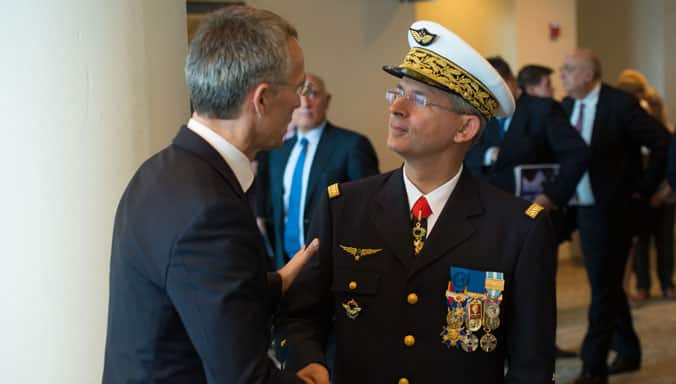NATO welcomes new Supreme Allied Commander Transformation

NATO Secretary General Jens Stoltenberg and the new Supreme Allied Commander Transformation (SACT) General Denis Mercier
General André Lanata took over as Supreme Allied Commander Transformation (SACT) today (12 September 2018) from General Denis Mercier at a change of command ceremony at Allied Command Transformation in Norfolk, Virginia.
NATO Secretary General, Jens Stoltenberg, congratulated General Lanata on his appointment to his new command. “General Lanata’s record is second to none, and he is the right person to lead the Command in the years ahead,” said Mr Stoltenberg.
General Lanata, former Chief of Staff for the French Air Force, began his career as a fighter pilot. He has flown more than 140 combat missions, including over Chad and Iraq, and with NATO operations over Bosnia and Kosovo.
The Secretary General also thanked General Mercier for his leadership over the last three years. He said, “Innovation is a fundamental part of NATO’s mission. Disruptive technologies such as the use of Big Data, Artificial Intelligence and robotics are leading to a revolution in military affairs. General Mercier’s focus on innovation and new technologies has helped to keep NATO at the forefront of this revolution.”
The Secretary General said, “It has been NATO’s privilege to have General Mercier serve as Supreme Allied Commander Transformation. His time as SACT has made an indelible impression on this Alliance. On behalf of all Allies and all NATO staffs, I would like to thank him for his outstanding contribution to our Alliance.”
General Mercier is also a fighter pilot, with over 180 combat missions, and a former Chief of Staff for the French Air Force.
The Supreme Allied Commander Transformation is one of NATO’s two strategic commanders. Allied Command Transformation (ACT) is responsible for promoting and overseeing the continuing transformation of Alliance forces and capabilities. ACT ensures that NATO’s war fighting capabilities remain relevant, provides an indispensable understanding of current and future security challenges, and contributes to the development of NATO doctrine, concepts and interoperability standards. The Command is also responsible for NATO’s training and education programmes.
















